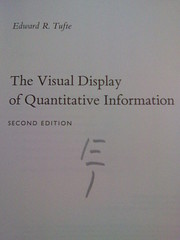
The Carnegie Mellon University has a lecture series "Journeys" where the speaker (usually a CMU professor) talks about what is important in life. A famous example of this was Randy Pausch's talk that was played in various forms (and also presented on Oprah) as well as turned into a book. Edward Tufte is best known for work on presenting data. He gave a talk yesterday about data presentation. Today's talk was on life. n=1 is an acknowledgement that these are observations based on a sample of 1, himself. With the statistician's view of how well you can generalize from that (not at all.)
His story is one of a polymath. His was an academic track. But while his degree is in statistics, his first academic job was political economy, and he has had positions in Political Science, statistics and computer science. And he is a "B-rate" artist (meaning he can get his work shown in B-rate galleries.) But this talk is advertised about being about academics.
One of his learning moments was the encouragement to do work of lasting value. He started out as a political economy, working on things very up to date, like results of the last (or next) election. Just like untold multitude's of junior political science professors. And the parallel in any field is to look for 'hot' topics. Which change like the wind. He says the reason he was able to jump from field to field was his ability to look at a field and identify what the key issues of the field were, and spend his time working on those. His point is that much of the academic world becomes focused on itself, on its own controversies and issues of the profession. So that he was always able to enter a field and distinguish himself by ignoring that and focusing on the knowledge of the subject itself.
There is a researcher working with us that I've been trying to give some advice. And one was telling him that one of the primary skills that should have been developed when he was getting his Ph.D. was the ability to identify what was important and what was trivial detail. Does this work? My grad students and the post-docs I work with have noticed that when I turn my attention to something, I learn and pick out the important details of papers and texts (in new areas) faster then they can. And I am reasonably good about telling them a few weeks in advance what they will need to know and be able to do down the line in our projects.
I think Tufte touches one of the reasons I was not that interested in academia. I was more interested in actual problems and issues, not so much in what an academic profession thought of as an issue. And in my exploration of academia, that is one thing that I bring to my host department, I probably deal with the messiness of the real data better then anyone else there. Tufte made the comment that it is instructive to observe how the data that you are using is collected, because they give you insight. In my case, some of the data sets I use have my name in the recorder block. Because I was the one writing the report at 2:00 in the morning. And I have to agree, that is useful knowledge. I hope that it is an advantage that I can make useful.
No comments:
Post a Comment